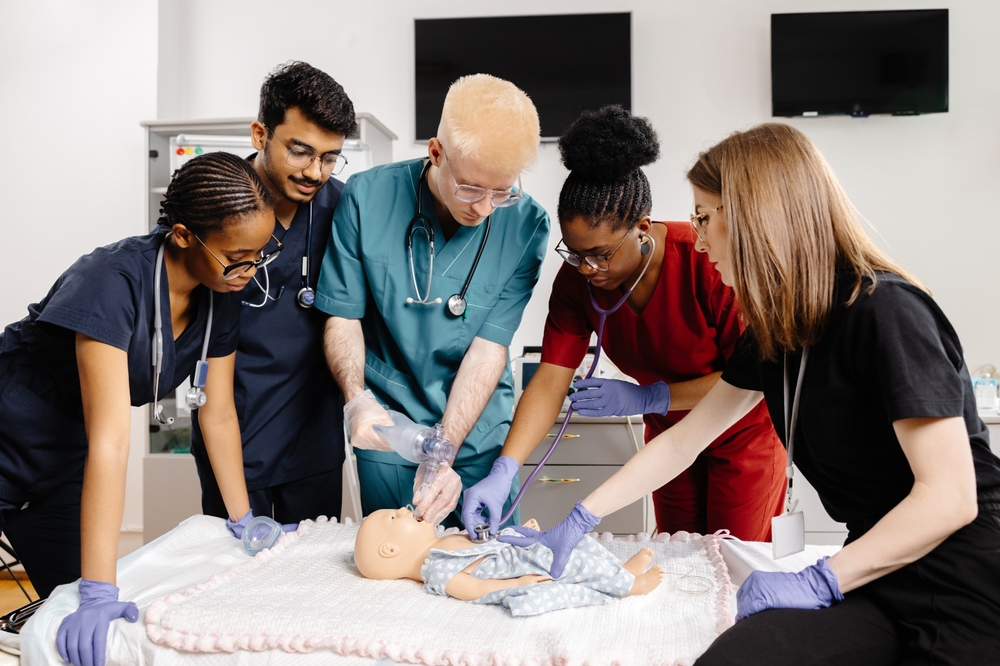Medical professionals face unique challenges when dealing with grief and loss in healthcare settings. As a healthcare worker, you're exposed to death and suffering regularly, creating emotional burdens that can impact both your professional performance and personal well-being.
The daily reality of patient care brings you face-to-face with:
These experiences can be particularly intense in specialized areas requiring advanced certifications like ACLS, BLS, or Neonatal Resuscitation, where life-and-death situations are common.
Your medical training likely focused on technical skills and patient care protocols, leaving little preparation for handling the emotional aftermath of loss. This gap in professional education can leave you feeling isolated and uncertain about how to process grief while maintaining your effectiveness as a healthcare provider.
This guide offers practical strategies to help you navigate grief in the medical field. You'll discover methods to acknowledge your emotions, build support networks, and maintain your well-being while continuing to provide excellent patient care. These tools are essential for sustaining a long-term career in healthcare while preserving your emotional health.
In addition to these strategies, it's also crucial to stay updated with your certifications. For instance, enrolling in an online PALS course through Affordable ACLS could enhance your skills and ensure you are fully equipped to handle any situation. Furthermore, if you're considering recertification for your BLS or ACLS, Affordable ACLS offers comprehensive recertification courses that can help you refresh your knowledge and skills.
Medical professionals face a unique duality of grief that sets them apart from many other professions. The emotional toll stems from both personal losses and the frequent encounters with patient deaths, creating a complex web of emotional challenges.
Grief experienced by medical professionals can stem from various sources, including:
The standard medical training programs, including BLS training and PALS certification, primarily focus on technical skills and patient care protocols. This leaves a significant gap in emotional preparation. A study of US medical programs revealed that only 18% include specific training on handling professional grief.
Healthcare workers experienced unprecedented levels of grief during the pandemic:
Medical professionals often carry unprocessed grief due to:
Research shows that unaddressed grief in healthcare settings leads to:
The impact extends beyond emotional distress:
Health care training institutions are slowly recognizing these gaps. New medical programs online now incorporate grief management modules, but implementation remains inconsistent across training platforms.
The emotional weight of grief affects medical professionals' ability to provide optimal care. A survey of emergency department staff showed that 76% reported their grief experiences influenced their patient interactions, highlighting the need for comprehensive support systems within healthcare institutions.
To better manage critical situations during such emotionally taxing times, mastering specific protocols like the Adult Tachycardia with a Pulse Algorithm can be beneficial. Furthermore, exploring how AI is transforming emergency cardiac care could provide insights into improving diagnosis, treatment precision, and overall patient outcomes amidst these challenges.
In addition, it's crucial for healthcare institutions to recognize the profound impact of grief on their staff and implement strategies to address this issue. As highlighted in a study published in BMC Medicine, addressing the psychological

Grief is a natural response to loss, and it's important for medical professionals to acknowledge it as such. Here are some effective strategies that can help them process their grief:
Healthcare workers need permission to feel their emotions without judgment. The old way of keeping emotional distance has changed, and now there's a more balanced approach that recognizes the human aspect of medical care.
The integration of grief support into medical programs and advanced life support training has shown positive results. Healthcare facilities implementing structured grief support programs report:
Regular participation in ACLS courses provides opportunities to process difficult cases while maintaining professional competency. These sessions create safe spaces for healthcare workers to discuss challenging experiences and learn from collective wisdom.
Medical professionals can normalize their grief experience by:
In addition, PALS certification can equip those working with children with essential skills needed to save lives during critical situations like sudden cardiac arrest or severe allergic reactions.
To further enhance learning and retention in online courses, it's beneficial to adopt some best study tips tailored for online course takers.
Medical professionals need strong support systems to process grief effectively. Your network can include both personal and professional connections who understand the unique challenges of healthcare work.
Your hospital or healthcare facility likely offers Employee Assistance Programs (EAP) with confidential counseling services. These programs understand the unique stressors medical professionals face and can provide targeted support for grief processing.
Remember that seeking help strengthens your ability to provide quality patient care. Professional support groups offer safe spaces to process complex emotions without judgment while connecting with others who share similar experiences.
In addition, enhancing your medical skills can also contribute to your confidence and emotional resilience. For instance, mastering ACLS algorithms can significantly improve your emergency care training and life-saving skills. You might consider exploring resources like Solo Provider Adult BLS for more targeted learning. Engaging in these training programs not only equips you with essential skills but also provides an opportunity to connect with fellow healthcare professionals, thereby expanding your support network.
Creating a supportive workplace environment starts with recognizing signs of grief in your colleagues. Watch for behavioral changes such as:
To effectively support a grieving colleague, it's crucial to engage in active listening. Here are some practices to consider:
When expressing sympathy to grieving colleagues, authenticity matters more than perfect words. Simple phrases like "I'm here for you" or "This must be incredibly difficult" can provide meaningful support.
Building a grief-aware workplace culture requires consistent effort from all team members. Regular team meetings can incorporate discussions about:
Healthcare facilities can implement structured support systems such as:
It's important to remember that grief manifests differently for each person. Some colleagues might need space while others seek connection. Respect individual preferences while maintaining an open door policy for support when they're ready.
In such circumstances, understanding the psychological effects of grief can be beneficial for both the grieving individual and their colleagues. This knowledge can foster empathy and patience, making it easier to navigate the complexities of grief within the workplace.

Healthcare professionals experiencing unaddressed grief often display subtle yet significant stress indicators. These warning signs can manifest in various ways:
The risk of developing Post-Traumatic Stress Disorder (PTSD) increases when these symptoms remain unaddressed. Research indicates that healthcare workers who experience multiple patient losses without proper grief processing are particularly vulnerable to PTSD.
It's crucial for healthcare professionals to recognize the urgency of their condition, especially when they start experiencing symptoms such as intrusive thoughts about patient deaths or flashbacks to traumatic medical events. In such cases, immediate action is required.
Healthcare facilities can implement structured intervention programs:
Early recognition and intervention prevent the escalation of grief-related stress symptoms into more severe mental health conditions. Healthcare professionals who notice these signs in themselves or colleagues should prioritize seeking appropriate support through available channels.
In some situations, it may be necessary to move a victim due to direct danger or necessity for care. However, this should generally be avoided unless absolutely essential.
Moreover, it's important to stay updated on guideline changes related to Basic Life Support (BLS) certification as these can provide valuable knowledge in managing health crises effectively.
Finally, understanding the importance of post-resuscitation management and when to transfer a patient to tertiary care is crucial, as highlighted in our PALS certification study materials.
Professional development serves as a powerful anchor during emotionally challenging times. Regular ACLS recertification and continuing education provide healthcare professionals with renewed confidence and enhanced skills to handle critical situations.
Medical professionals can integrate self-care practices alongside their professional development through these practical strategies:
Creating a balanced approach between skills maintenance and emotional well-being helps healthcare professionals build resilience. Many healthcare organizations now offer integrated programs combining technical training with mental health support.
Healthcare professionals can strengthen their ability to provide quality care by maintaining their clinical skills through regular recertification programs like ACLS and BLS. These structured learning environments offer safe spaces to process experiences while improving technical abilities.
Professional development courses provide opportunities to:
The combination of skills maintenance and dedicated self-care practices creates a foundation for sustainable career longevity in healthcare professions. Regular participation in health care courses reinforces both technical expertise and emotional resilience, essential elements for managing grief in medical settings.
The healthcare field demands extraordinary resilience from medical professionals who face loss and grief as part of their daily work. These grief support tips serve as essential tools for maintaining emotional well-being while delivering quality patient care.
Key takeaways for medical professionals:
Your emotional health directly impacts patient care quality and workplace dynamics. By implementing these grief support strategies, you create a more compassionate healthcare environment that benefits both medical professionals and patients.
Remember: You can't pour from an empty cup. Prioritizing your emotional well-being isn't selfish—it's necessary for sustainable, effective healthcare delivery. The strength of the medical community lies in supporting each other through difficult times while maintaining the highest standards of patient care.
Take action today by starting conversations about grief support in your workplace. Share your experiences, listen to your colleagues, and advocate for mental health resources. Together, we can build a more resilient healthcare system that acknowledges and addresses the emotional challenges of medical professionals.
.jpg)

